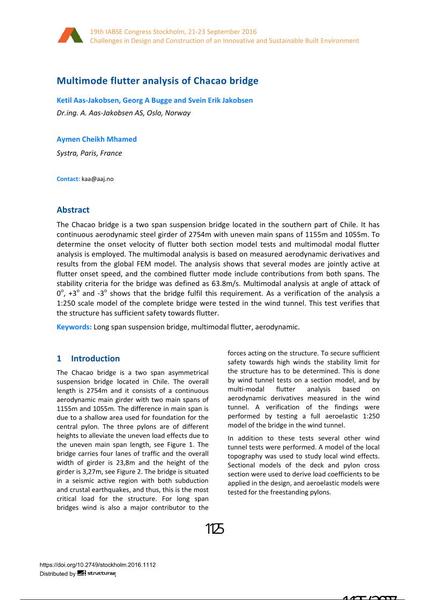Multimode flutter analysis of Chacao bridge

|
|
|||||||||||
Bibliografische Angaben
| Autor(en): |
Ketil Aas-Jakobsen
(Dr.ing. A. Aas-Jakobsen AS, Oslo, Norway)
Georg A. Bugge (Dr.ing. A. Aas-Jakobsen AS, Oslo, Norway) Svein Erik Jakobsen (Dr.ing. A. Aas-Jakobsen AS, Oslo, Norway) Aymen Cheikh Mhamed (Systra, Paris, France) |
||||
|---|---|---|---|---|---|
| Medium: | Tagungsbeitrag | ||||
| Sprache(n): | Englisch | ||||
| Tagung: | IABSE Congress: Challenges in Design and Construction of an Innovative and Sustainable Built Environment, Stockholm, Sweden, 21-23 September 2016 | ||||
| Veröffentlicht in: | IABSE Congress Stockholm, 2016 | ||||
|
|||||
| Seite(n): | 1125-1132 | ||||
| Anzahl der Seiten (im PDF): | 8 | ||||
| Jahr: | 2016 | ||||
| DOI: | 10.2749/stockholm.2016.1112 | ||||
| Abstrakt: |
The Chacao bridge is a two span suspension bridge located in the southern part of Chile. It has continuous aerodynamic steel girder of 2754m with uneven main spans of 1155m and 1055m. To determine the onset velocity of flutter both section model tests and multimodal modal flutter analysis is employed. The multimodal analysis is based on measured aerodynamic derivatives and results from the global FEM model. The analysis shows that several modes are jointly active at flutter onset speed, and the combined flutter mode include contributions from both spans. The stability criteria for the bridge was defined as 63.8m/s. Multimodal analysis at angle of attack of 0o, +3o and -3o shows that the bridge fulfil this requirement. As a verification of the analysis a 1:250 scale model of the complete bridge were tested in the wind tunnel. This test verifies that the structure has sufficient safety towards flutter. |
||||
